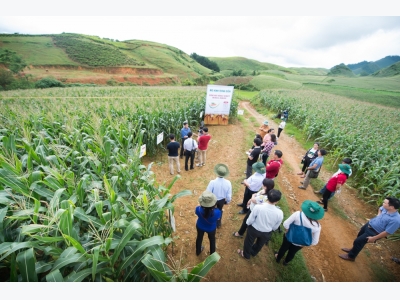Local authorities draw up solutions to help corn farmers in Son La

Corn is the main crop in the northern mountainous province of Son La, thus, improving yield and quality so that domestic corn products can compete with imports is one of the most important missions for the authorities of the province as well as Vietnam.
Reducing import prices and slow development of corn production in the country put farmers in a hard place
Vietnam’s corn problems
Recently, the Department of Crop Production (DCP) under the Ministry of Agriculture and Rural Development hosted a workshop on “Sustainable development of corn in northern Vietnam” in the northern mountainous province of Son La, with the aim of drawing up solutions for restructuring and development of corn production in the northern provinces.
The acreage of corn crop accounts for more than a half of the total agricultural land because corn has been defined as the main crop in Son La province. Although it has brought about huge financial benefits for farmers, recently, the decrease in price of imported corn has led to many difficulties.
According to Tran Xuan Dinh, deputy head of DCP, Vietnam is lacking suitable techniques for corn production in each specific ecological region. Therefore, corn yield is still low, while selling prices are high. These are big disadvantages for domestic corn products in the competition with imported corn.
According to National Institute of Agricultural Planning and Projection, expenses for domestic corn grew by about VND4,200-4,300 ($0.18-0.19) per kilogramme, so farmers have to sell corn at the price of at least VND5,000 ($0.22) per kilogramme to gain profit. Meanwhile, the price of imported corn is very low. To compete with imported corn products, Vietnamese farmers need a solution to reduce production costs and increase yield.
A solution
According to the Son La Plant Protection Department, compared to 2015, the acreage of corn crop decreased by about four per cent, but the yield has risen by 4.8 per cent, an equivalent of about 1.78 hundredweight per hectare. Total yield increased by 0.6 per cent, an equivalent of 3,642 tonnes, compared to 2016.
These changes derive from local authorities, enterprises, and farmers’ care and efforts in choosing seedlings, enhancing farming techniques, and the application of technology and science in farming. In 2015, genetically modified (GM) corn plants that resist pests and herbicides were introduced to farmers in Son La. The most popular pest and herbicide-resistant corns were produced mainly by Dekalb Vietnam Co., Ltd. (a company specialising in GM corns), such as DK9901, DK6919, DK9955 or Dekalb Genuity corns like DK9955s and DK6919s.

Nguyen Van Tien, farmer from Loong Phieng in Yen Chau district
Nguyen Van Tien, a farmer in Loong Phieng in Yen Chau district said, “Our family has been planting corn for three generations now. Our acreage for corn is over five hectares. Most of the harvest we sell for feed processing companies. Last year, we tried to grow the Dekalb Genuity corn and this new kind of corn brought about better results as the yield increased by 3-5 hundredweight per hectare. Thus, this year, we switch entirely to this new-generation corn that has higher yield and cut down on investment costs. In particular, total expenses have decrease by 30 per cent because we can save on labour costs and use less pesticides and herbicides. Regarding sales, Dekalb Genuity corn is easier to sell at a higher price because it has better quality due to its characteristic pest resistance. When the selling price of domestic corn is declining, we still gain profit because this new-generation corn brings higher profit, about VND3-4 million ($132-176) per hectare compared to other corn types.”

Dang Thi Thuy, investor from Chieng Hac in Moc Chau district
According to Dang Thi Thuy, an investor in Chieng Hac in Moc Chau district, “Every year we invest in local production by providing more than 200 local farmers with input materials, such as seedlings, pesticides, herbicides, fertilisers, and helps them sell their products. All of the input and selling prices are based on the market price. We estimate that every year we help farmers to sell about 4,000 tonnes of corn, and we then resell corn to feed processing plants. Thus, a level of yield and quality that adapts the requirements of these plants is the most important factor when it comes to choosing seedlings to supply for farmers. With the new-generation corn, the quality was highly enhanced, so after growing the new corn on part of our farms, this year, we switch entirely to Dekalb Genuity corns.”
Có thể bạn quan tâm
 General Department of Vietnam Customs handles obstacles of cashew companies
General Department of Vietnam Customs handles obstacles of cashew companies General Department of Vietnam Customs has received and processed obstacles on the implementation of Decision 15/2017 / QD-TTg of the Prime Minister of companies
 Coffee varieties under the microscope amid lower quality harvest
Coffee varieties under the microscope amid lower quality harvest Nguyen Nam Hai, deputy chair of the Association, said it now expects coffee output for this year’s crop to touch approximately 1.4 million tons
 Vietnam, Mozambique discuss promoting agricultural ties
Vietnam, Mozambique discuss promoting agricultural ties Vietnam is willing to share experience with Mozambique in rice and soybean production, and has partnered with several African countries to successfully develop